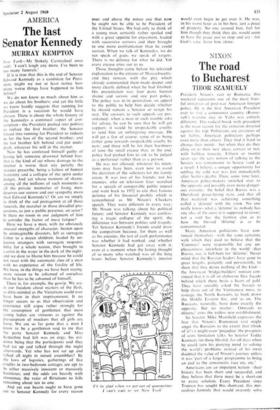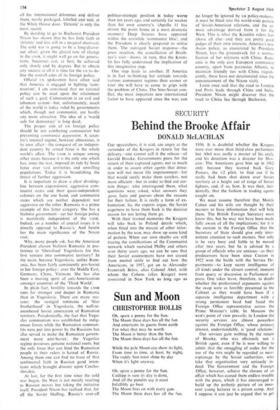NIXON
The road to Bucharest
TIBOR SZAMUELY
President Nixon's visit to Rumania this weekend represents one of the most fruit- ful initiati% es of post-war American foreign policy. He is the first American President ever to ►kit a communist country (Roose- velt's wartime stay in Yalta was entirely different). This radical break with precedent is the main reason for the criticism directed against the trip. Politicians arc creatures of set habits. American politicians perhaps even more than others. They find it hard to change their minds but when they do they cling on to their new ideas, correct or not. with bulldog tenacity. Fifteen or twenty years ago the very notion of talking to the Soviets was tantamount to heresy (and as a result. I beliew, a unique opportunity for settling the cold war was lost immediately after Stalin's death). Then, some time later, American policy-makers switched over to the opposite and possibly even more danger- ous extreme: the belief that Russia was a liberalised. peace-loving state, and that all that mattered was achieving something called a 'detente' with the USSR. No one really knows what a 'detente' is; nobody has any idea of the areas it is supposed to cover; not a soul has the faintest clue as to how the blessed 'detente' is to be consummated.
Many American politicians have con- vinced themselves -- with the same certainty with which they used to believe that the 'Commies' were responsible for any un- pleasantness anywhere in the world—that Russia, too, is hell-bent for 'détente'. Never mind that the Russian leaders have gone to great lengths, patiently and persistently, to show that they desire nothing of the kind-- the American 'bridge-builders' remain con- vinced that it is all an elaborate Slav façade behind which there beats a heart of gold. They have sociably asked the Soviets to help them out of the Vietnamese mess, to assuage the North Koreans, to bank down the Middle Eastern fire, and so on. The Russians, naturally, have done exactly the opposite. But no matter: Onwards to détente! cries the witless new establishment.
So Senator Mike Mansfield expresses the fear that Nixon's Rumanian visit might anger the Russians to the extent that (think of it!) it might even 'prejudice' the prospects of arms limitation talks. So Senator Teddy Kennedy (in those blissful, far-off days when he could turn his piercing mind to solving the world's problems instead of his own) doubted the value of Nixon's journey unless it was 'part of a larger programme to bring an end to the armaments race etc. etc.'
Americans are an impatient nation—their history has been short and successful. and they believe that there must be a short-cut to every solution. Every President since Truman has sought this short-cut, this mir- aculous formula that would instantly solve all his international dilemmas and deliver them, neatly packaged, labelled and tied, at the White House door. 'Détente' is only the most recent.
By deciding to go to Bucharest President Nixon has shown that he has little faith in 'détente' and less still in a magical short-cut. The cold war is going to be a long-drawn- out affair; given the glacial rate of change in the USSR, it might well go on for genera- tions. Successes can, at best, be achieved only slowly and by degrees. But to obtain any success at all it is time for the us to de- fine the overall aims of its foreign policy.
Official us spokesmen have often said that America is engaged in fighting 'com- munism'. I am convinced that no rational policy can be used upon the attainment of such a goal. Communism is an evil and inhuman system—but, unfortunately, much of the world is today ruled by governments which, though not communist, are hardly any more attractive. The idea of a 'world safe for democracy' is long dead.
The proper aim of us foreign policy should be not combating communism but preventing communist aggression. A coun- try's internal regime, however obnoxious, is its own affair—the conquest of an indepen- dent country by armed force is the whole world's affair. The USSR is unique among other states because it is the only one which has, since the war, imposed its rule by brute force over vast territories and unwilling populations. Today it is brandishing the threat of further aggression.
It is important to draw a clear dividing- line between expansionist, aggressive com- munist states and their quasi-independent colonies on the one hand, and communist states which are neither dependent nor aggressive on the other. Rumania is a prime example of this latter category. She has a Stalinist government—yet her foreign policy is manifestly independent of the USSR. Indeed, on a number of crucial issues it is directly opposed to Russia's. And herein lies the main significance of the Nixon visit.
Why, many people ask, has the American President chosen Stalinist Rumania in pre- ference to 'liberalised' Yugoslavia for this first venture into communist territory? In the main, because Yugoslavia, unlike Rum- ania, has been fairly consistently pro-Soviet in her foreign policy: over the Middle East, Germany, China, Vietnam. She has also been a moving spirit of anti-Americanism amongst countries of the 'Third World'.
In plain fact, hostility towards the USSR runs far stronger and deeper in Rumania than in Yugoslavia. There are many rea- sons: the vestigial remnants of 'Slav brotherhood' in Yugoslavia, the well-re- membered Soviet annexation of Rumanian territory. Paradoxically, the fact that Yugo- slav communism was established by indig- enous forces while the Rumanian commun- ists were put into power by the Russians has also served to make the Rumanian govern- ment more anti-Soviet: the Yugoslav regime possesses genuine national roots, but the only force that can bind the Rumanian people to their rulers is hatred of Russia. Among them one can find no trace of that sentimental faith in Russian good inten- tions which brought disaster upon Czecho- slovakia.
At last, for the first time since the cold war began, the West is not merely reacting to Russian moves but taking the initiative itself. President Nixon has realised that, for all the Soviet bluffing, Russia's over-all politico-strategic position is today worse than ten years ago, and certainly far weaker than his own country's. (Apollo 11 has driven the point home in a most dramatic manner.) Deep fissures have appeared within the erstwhile 'communist bloc', and the President is clearly prepared to utilise them. The outraged Soviet response—the press reaction, the cancellation of Brezh- nev's visit—shows, in turn, that the Krem- lin has fully understood the implication of this imaginative step.
One step leads to another. If America is in fact re-thinking her attitude towards various communist regimes then sooner or later she will have to come to grips with the problem of China. The Sino-Soviet con- flict, the most important new international factor to have appeared since the war, can no longer be ignored by us policy-makers: it must be fitted into the world-wide pattern of Soviet-American relations, and the ut- most advantage derived from it for the West. This is what the Kremlin rulers fear above all else—and they are pretty good judges of their own interests. America's new Asian policy, as enunciated by President Nixon, lays the groundwork for a norma- lisation of her relations with China. Rum- ania is the only east European communist country, apart from paranoiac Albania, to maintain friendly ties with China (signifi- cantly, these have not deteriorated since the announcement of the Nixon visit).
Lenin once said that the road to London and Paris leads through China and India. President Nixon might discover that the road to China lies through Bucharest.



































 Previous page
Previous page